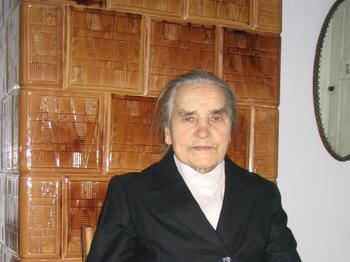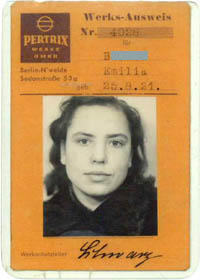Emilia B.: Polish forced laborer in Berlin battery factory
Emilia B. was deported to Berlin to perform forced labor in 1943. She returned to her hometown and lives today in a three-generation household in her parents’ house. Out of a longing for her home, she began writing poetry in Berlin.
- Born in 1921 in the countryside (near Zamość); grew up with two younger siblings in a small farming family and among a polyethnic and multiconfessional community
- 1942 – In the course of expropriations by the Germans, the family flees in order to escape deportation
- December 1942: Arrest and internment of Emilia B. and her siblings in Zamość
- Early 1943: Deportation to Berlin
- Slave laborer at the Pertrix GmbH, a Quandt family battery factory
- Detained in a barrack camp, frequent contact with her minor brother who was housed and working in another part of Berlin
- Returns to her hometown after liberation in April 1945
- 1947: Marries a "repatriate" from the East (from the region annexed by the Soviet Union), three children
- Management of parents’ farm
- Even in her old age she actively participates in the social life of her community and writes poetry.
Interview Data:
-
Audio interview in Polish
-
Interviewed on December 29, 2005 by Jarosław Pałka in Komarów
-
Interview duration: 3:14 hours
During her period of forced labor for Pertix in Berlin, Emilia B. wrote a new text to the melody of a Polish soldier’s song "Wojenko, wojenko, cóżeś ty za pani"
Wojenko, wojenko cóżeś uczyniła,
Żeś biednych Polaków na Pertrix rzuciła!
"In die Reihe!" - ryczy byk co siły,
Żeby wybiegł z baraku kto cały i żywy.
Niedobrze majstrowa patrzy, niby sowa,
Żeby nikt przy pracy nie powiedział słowa.
Nieraz majster krzyczy, my się nie boimy
I choć pracujemy, alarmu prosimy.
My wierzymy mocno, nam się nic nie stanie,
Z berlińskiej fabryki gruz się pozostanie.


